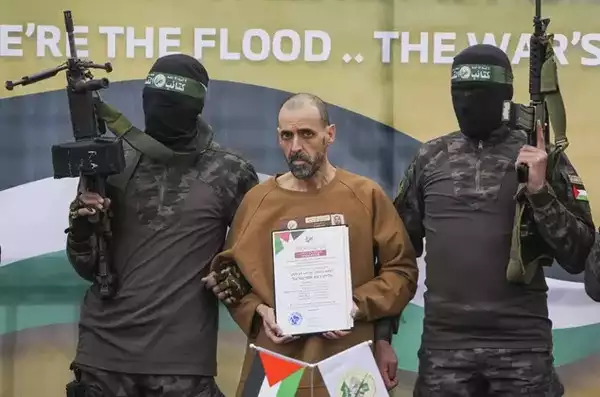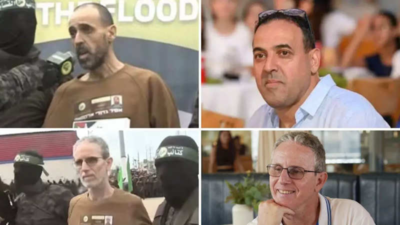Israel and Hamas carried out a fifth exchange of hostages and prisoners on Saturday as part of a ceasefire agreement that has paused the 16-month conflict in Gaza.
Hamas released three Israeli civilian hostages, while Israel freed 183 Palestinian prisoners. This marked the fifth such exchange since the ceasefire began on January 19. So far, 21 hostages and over 730 Palestinian prisoners have been released.
Freed hostages face harsh realities
The Israeli hostages released on Saturday are beginning to process the realities they now face.
Eli Sharabi, freed after 16 months in captivity, learned upon his return that his wife and two daughters had been killed in the October 7 attack, according to Israeli media reports.
Or Levy’s mother, Geula, said her son “was not sure” what had happened to his wife, as he had not had access to media while in captivity. Levy was taken from a bomb shelter near the Nova music festival, where his wife, Einav, was killed. He also inquired about Hersh Goldberg-Polin, an American-Israeli hostage who was taken from the same shelter and later killed in captivity. Levy was reunited with his 3-year-old son on Saturday.
Another freed hostage, Ohad Ben Ami, sat with his wife and three daughters in a hospital corridor. “I have a lot of things to catch up on,” he told them, news agency AP reported. A resident of Kibbutz Be’eri, one of the hardest-hit communities on October 7, Ben Ami said he needed to understand what had happened that day. “I need to get answers to a lot of things, and I know some of them will be difficult answers,” he said in footage released by the Israeli Prime Minister’s office.
Stories of abuse and torture
Hamas held male hostages in captivity for nearly 500 days under conditions that left them unable to walk before their release. The captives said they were starved, tortured, and kept in spaces too small to stand or move.
Terrorists hung them by their feet, tied them with rope, gagged them, and burned them with objects. They were given rotten pita bread to share after long periods without food or water, according to a Daily Mail report.
“We were treated like animals,” one hostage said after being freed.
Another hostage Or Levy, 34, was released on Saturday along with Eli Sharabi, 54, and Ohad Ben Ami, 56. “I was bound in chains – towards the release I learned to walk,” Levy was quoted as saying by the Daily Mail.
The men described being interrogated and physically abused for 491 days. Hamas tied them up, strangled them, and gagged their mouths with cloth. Before their release, they were given food to help them stand for the handover ceremony.
Israeli channel Kan 11 detailed the abuse, saying: “It is impossible to process the things we are about to reveal now. The three were deliberately starved, going for long days without any food at all.”
Levy had attended the Nova music festival with his wife Einav, who was killed by Hamas. He only learned of her death upon his release.
Sharabi also found out that his wife Lianne and daughters Noiya, 16, and Yahel, 13, had been killed. Hamas taunted him during the handover, making him say he looked forward to seeing his family.

At Sheba Medical Centre near Tel Aviv, where the three are being treated, Levy’s brother Michael spoke about his emotional reunion. “Yesterday, after a year and four months, I saw my brother again. I hugged him, but he wasn’t the same Or who left home on October 7.”
Michael described the physical toll on his brother, saying: “Without a shadow of a doubt, he wouldn’t have survived for another two, three weeks or a month in captivity.”
The abuse was reportedly directed by Hamas leader and October 7 attack planner Yahya Sinwar, who was killed by Israel last October.
Seventy-six hostages remain in Gaza.
The hostages had been taken during the Hamas-led attack on Israel on October 7, 2023, which resulted in about 1,200 deaths, mostly civilians, and triggered the war. Among the Palestinian prisoners released by Israel were 111 from Gaza who had been detained without trial after the attack.
According to Gaza’s health ministry, more than 47,000 Palestinians have been killed in Israel’s military response, over half of them women and children. The ministry does not specify how many of the dead were militants.
Concerns have been raised that US President Donald Trump’s proposal to relocate the Palestinian population from Gaza could put the ceasefire agreement at risk.
Meanwhile, Israeli Prime Minister Benjamin Netanyahu faced criticism from Arab leaders after suggesting a Palestinian state could be established in Saudi Arabia. During an interview on pro-Netanyahu Channel 14, an interviewer mistakenly said “Saudi state” instead of “Palestinian state.” Netanyahu responded: “A Palestinian state. Unless you want the Palestinian state to be in Saudi Arabia, they have a lot of territory.”
The Arab League called the remarks “a complete detachment from reality.”








